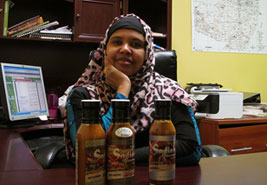Wednesday, April 03, 2013
Since 2007, the city of Minneapolis has given out more than a million dollars in loans through a program designed to help immigrant entrepreneurs. But six years later, a number of those small businesses are struggling to pay the city back.

Korad Abdi, known as Sadia, has struggled to pay
back a $20,000 loan she received from the city of Minneapolis to
finance her company, Sadia Hot Sauce. (MPR Photo/Curtis Gilbert) |
Supporters of the program say these delinquent loans are an inevitable part of helping first-time business owners, and one City Council member wants to expand the program.
Minneapolis established the Alternative Finance Program in 2007 as a way to help Muslim immigrants start businesses. Religious law prohibits Muslims from paying interest, and so many of the east African immigrants in Minneapolis were unable to take advantage of the city's conventional small business loan program.
The program avoids that obstacle by structuring the payments as "principal and profit," rather than "principal and interest."
One program participant, Sadia Abdi, sold tomatoes, garlic and onions in the street as a girl growing up in Somalia. When she came to the United States in 1999, she began to dream of starting a business here, too.
A decade later, the city of Minneapolis helped make that dream come true, when its Alternative Finance Program gave a $20,000 loan to the company she started, Sadia Hot Sauce. But almost immediately, Abdi fell behind on the payments.
"I pay little by little, as much as I could, because I have to pay a lot of bills," she said. "The warehouse, the rent, all this stuff."
Business is slow, especially in the winter, she said. But she is not giving up.
"If I didn't die when I was pregnant with my child -- I didn't eat [for] three days ... I never die. I'm struggling, but I know I'm going to survive if I survived that day," Abdi said.
The city has not given up on her. Even though Abdi's loan has been delinquent for three years, Minneapolis has not written it off as bad debt.
Neither has the nonprofit African Development Center, which also gave her a $20,000 loan and administers the city's Alternative Finance Program. Executive Director Hussein Samatar, a member of the Minneapolis School Board, said Abdi's situation is frustrating, but he remains optimistic.
"Is it disappointing that she was slow to pay? Absolutely," Samatar said. "Could we have written off her? No question about it. But then we really felt that she had a bigger story to tell. She's an amazing entrepreneur. She's fantastic. She's figuring out what she needs to do. And this payment, we believe, is going to come."
The African Development Center has placed Abdi's loan on a watch list. It was one of a dozen loans on the list as of Dec. 31, all of which were delinquent at least two months. In total, those borrowers owe the city more than $100,000 in past-due payments.